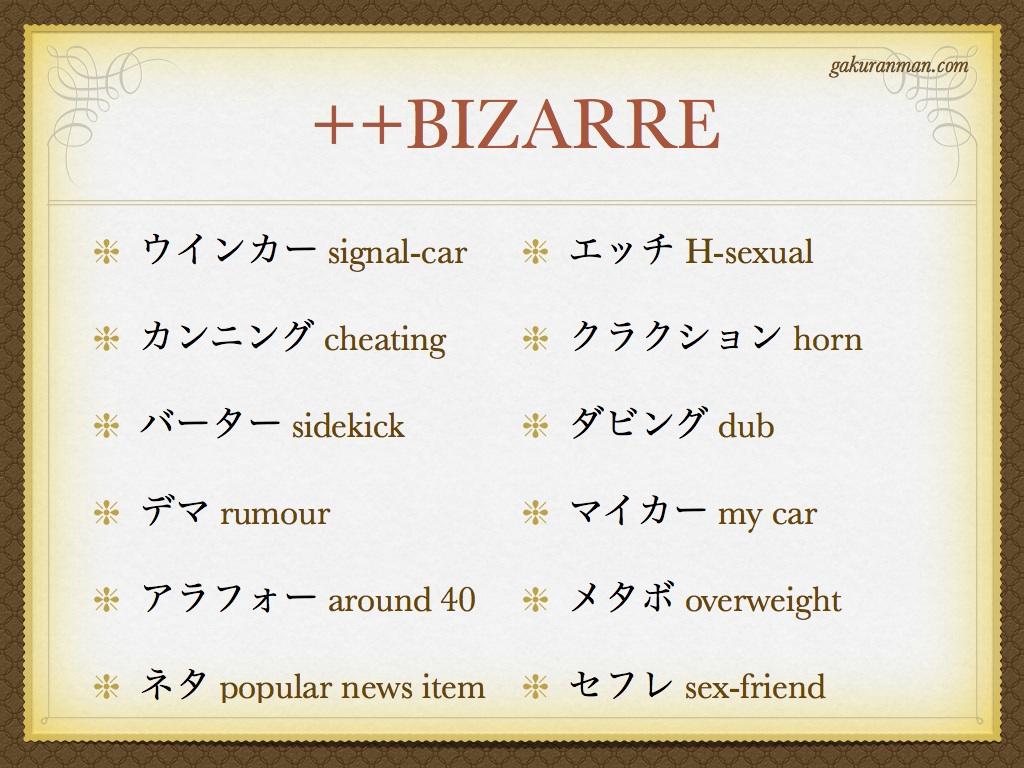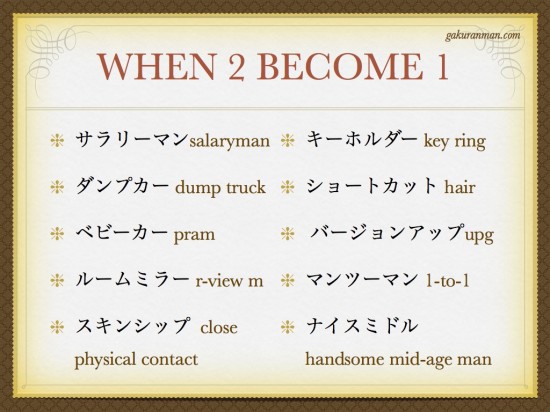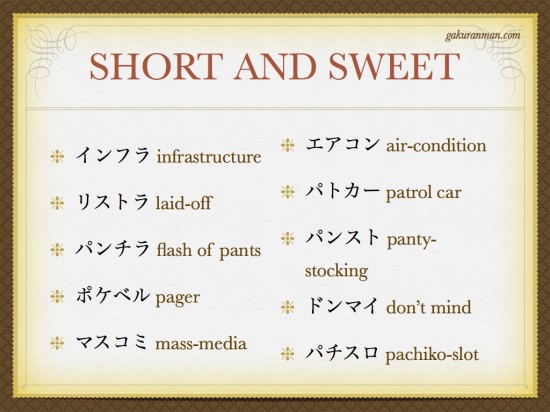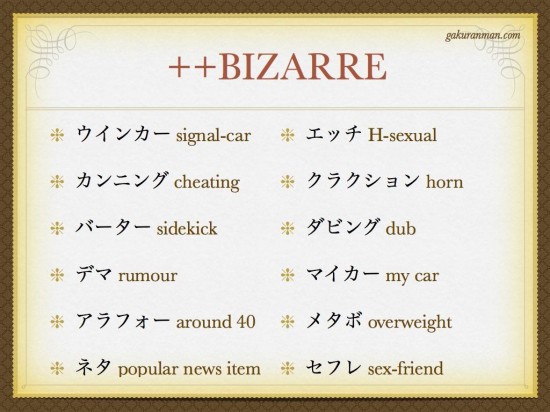In the previous lessons (1, 2) we looked at foreign words, as well as onomatopoeic and mimetic expressions. This time, we’ll be examining some really interesting terms that splice two or more words together!
Many of the words below are 和製英語 (わせいえいご) – words which were made in Japan but sound like English or were made from foreign words. As such, they very often will not be understand by native speakers of English.
Unifying Words
Let’s take a look.
サラリーマン
Salaryman (Salary + Man). The stereotypical Japanese white-collared employee who works long hours and goes out drinking with colleagues a lot. You knew this one, right? Men who have sold their soul to work and earn money.
ダンプカー
A dump truck (Dump + Car). One of those awesome trucks where the back lifts up to dump all the stuff it’s carrying.
ベビーカー
A pram / stroller. (Baby + Car) Curious… I suppose it is a sort of car, but hopefully the baby isn’t driving it!
ルームミラー
Rear-view Mirror (Room + Mirror). Perhaps it’s called a ‘Room Mirror’ because you check behind you to see how much room you have when reversing?
スキンシップ
Close Physical Contact (Skin + Ship). This is the close emotional bond between mother and child. It can also be used to describe situations where someone makes a lot of bodily contact with other people.
キーホルダー
Keyring (Key + Holder). It holds keys!
ショートカット
A short cut (Short + Cut). This means a short hair cut!
バージョンアップ
Upgrade (Version Up). This term can be used both for obvious things like software, as well as more abstract things, such as jokingly saying one has acquired a new skill. Version Up!
マンツーマン
One to One (Man + to + Man). A little outdated now? If we’re being all rosy and politically correct, we’d say ‘one-to-one’.
ナイスミドル
A handsome middle-aged man (Nice + Middle). No, really! A guy who looks good for his (middle) age.
Shortening
Continuing with the amalgamation of words then, let’s look at some words that shorten the original expressions. These can be difficult in Japanese because unless you know the original two words, it’s very tricky to fathom what the slimmed-down versions are!
インフラ
Infrastructure.
リストラ
Re-structure. This is usually a euphemism for firing people in Japan: リストラされた.
パンチラ
A flash of panties. Often used in anime as fan-service. Originally comes from パンツがちらりと見える.
ポケベル
A ‘pocket bell’, also known as a pager!
マスコミ
Mass Communication. The mass-media, such as newspapers, television and radio.
エアコン
Air Conditioning.
パトカー
Patrol Car. A police car, probably keeping a watchful eye on the neighbourhood.
パンスト
Panty Stockings. The combination of panties and tights, apparently. Compare to スパッツ, which are just normal tights/leggings you’d wear over your underwear. Curiously, the origin of スパッツ looks to be spatterdashes, which are more like gaiters – coverings for the legs outdoors.
ドンマイ
Don’t Mind! Somebody worried they might have upset you? Say ドンマイ、ドンマイ to them and reassure them that you’re fine and dandy.
パチスロ
Pachinko + Slot machines.
Bizarre Words
That about sums up the different categories, but to finish, here’s another set of words that I found to be rather odd. Just goes to show you how colourful the Katakana alphabet can be!
ウインカー
A ‘winker’. The car blinker lights! Evidently when we indicate to turn, we are winking.
カンニング
Cheating. Such as cheating on a test! Apparently it does come from the English ‘cunning’ (ずる賢い), but the meaning got warped and changed.
バーター
A sidekick. My best translation to date, anyway. Used to refer to celebrities who appear on Japanese gameshows who are not important enough to be able to appear on their own and hence must come out on stage with somebody else.
デマ
A rumour. This one comes from ‘demagoguery’ and refers to baseless rumours made up to incite and disadvantage an opponent, usually in a political context.
アラフォー
Around 40. Used to describe women who are middle aged, literally ‘around 40 years old’.
ネタ
A tasty topic. ネタ means a popular news item or story that is likely to get people talking and interested. Not just newspapers and the media though – anyone can create one. It originally comes from 種 (たね – seed) and is the reversed reading. It’s a term with a variety of uses, so we’ll return to it another time.
エッチ
Ecchi. Meaning ‘H’ – possibly derived from the first letter of the word ‘Hentai’ – ‘pervert’. There are various other suggestions on how the word was derived too, but it can on a variety of meaning depending on the context, usually describing something sexual, like horny, naughty or erotic.
クラクション
A horn. Comes from Klaxon – a trademark name for a type of horn.
ダビング
Dubbing. To dub a television show with voiceovers.
マイカー
My Car. The term マイ is tagged onto lots of words in Japanese to symbolise one’s personal something.
メタボ
Metabolic Syndrome. A buzzword in recent years. People are worried they have a metabolism that is more likely to make them get fat.
セフレ
Sex Friend. Just in case, y’know, you are ever in that situation…
Well, that rounds up the fundamentals! We’ll definitely re-visit Katakana Words again in the future, but I think that’s enough to play with for now :).




Leave a Reply